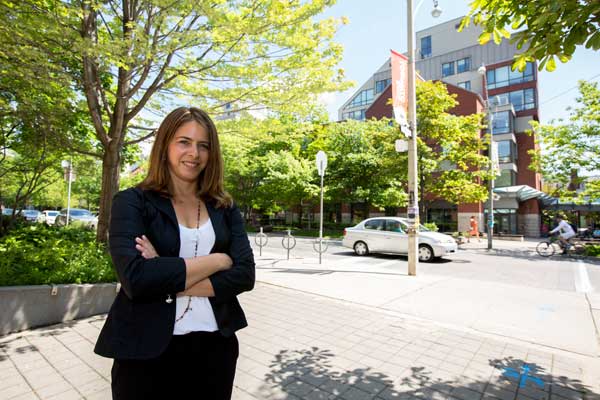
The civic university: exploring the ties between U of T and the city
Published: December 2, 2015
Shauna Brail has been at the University of Toronto for more than a decade but in the months following her appointment in July as urban affairs adviser to President Meric Gertler, she has been surprised to discover just how big the university is.
And how much work goes into establishing external partnerships.
“I have been at U of T for about 11 years and I felt I knew it pretty well, only to find out that it is a much bigger place, especially outside of Arts and Science,” she said.
“There is a tremendous amount of energy, thought and activity that goes into both faculty research, and also the many, many ways in which research is conducted with partners in which policy is translated from research findings, and in the ways in which both faculty and students work outside of the university in the community.”
One of the president’s key priorities is leveraging U of T’s location in the GTA and building partnerships with other universities, governments, community groups and public agencies.
“It makes considerable sense for the University of Toronto to explore new and imaginative ways to take advantage of our three campuses in the Toronto region, and to deepen our relationships with our local partners – public, private, and non-profit,” President Meric Gertler has said. “Working more closely with these groups to meet challenges and seize opportunities together, we will make this region a better place in which to live, work and prosper.”
Read more about the priorities
U of T News spoke to Brail, an associate professor in the teaching stream in the urban studies program at Innis College, to get an update on her activities.
“A lot of what I have learned is that it is not for lack of talent or energy, but because of our size and the decentralized way in which things are done, it takes time to bring to coherence to existing programs,” she says.“It takes time to build partnerships both internally and externally.”
One such on-going program has already been enhanced because of the president’s commitment. U of T, through Innis College, has had a relationship with the Adult Learning Centre (now called the TD Centre of Learning) in Regent Park for several years and in September a non-credit, once-a-week course for 30 students began focusing on the area.
“It’s a really positive story. It demonstrates the ways in which we work with the community, not just for the community,” she said. Faculty, community members and residents all co-operated to establish the course, with Brail as the co-ordinator. “It’s really been a joint and reciprocal process at every step of the way.”
Brail is aiming to “create a process where people within the university can convene around particular issues or initiatives or projects that span faculties, that span departments, that span the three campuses.”
The StudentMoveTO initiative is one of those projects, she said. Last September, U of T, along with the other three universities in Toronto, launched a massive on-line survey of 170,000 post-secondary students to learn more about their commutes to school.
Read more about StudentMove TO
“It created opportunities for faculty to work together and created an opportunity for U of T to work co-operatively with the other universities in the city of Toronto. And the fact that the launch was held at [Toronto] City Hall helped establish and signal our intention to work in a more clear, direct and focused way with the city.”
Brail meets with Gertler monthly to discuss the initiatives. “From a faculty perspective, from the student perspective and from the community partner perspective, the signal that there are advisers to the president on engagement has opened the doors for people to come in and pitch ideas, or get some support for a particular project.”
Below: Brail on a walk exploring the city with Urban Studies students at 401 Richmond. Photo by Brianna Goldberg

An example is the student-initiated “Civic-Spark” project, she said. “They know that these are our priorities and they come to talk about working with their partner, CivicAction.”
CivicAction and the University of Toronto staged an “Emerging Leaders Network” conference on Nov. 7. Nine U of T students attended, with Innis College Principal Charlie Keil opening the session, entitled “Reimagine Where We Live.”
Brail said in the four months she has been the president’s urban affairs adviser there have been several “small initiatives that will grow into larger opportunities,” including a meeting with faculty members from the University of Toronto’s Munk School of Global Affairs and community members in Alexander Park about community safety.
Other initiatives in the planning stages relate to international opportunities in other cities, including new internships, and an urban study tour. Both illustrate Gertler’s priorities.



